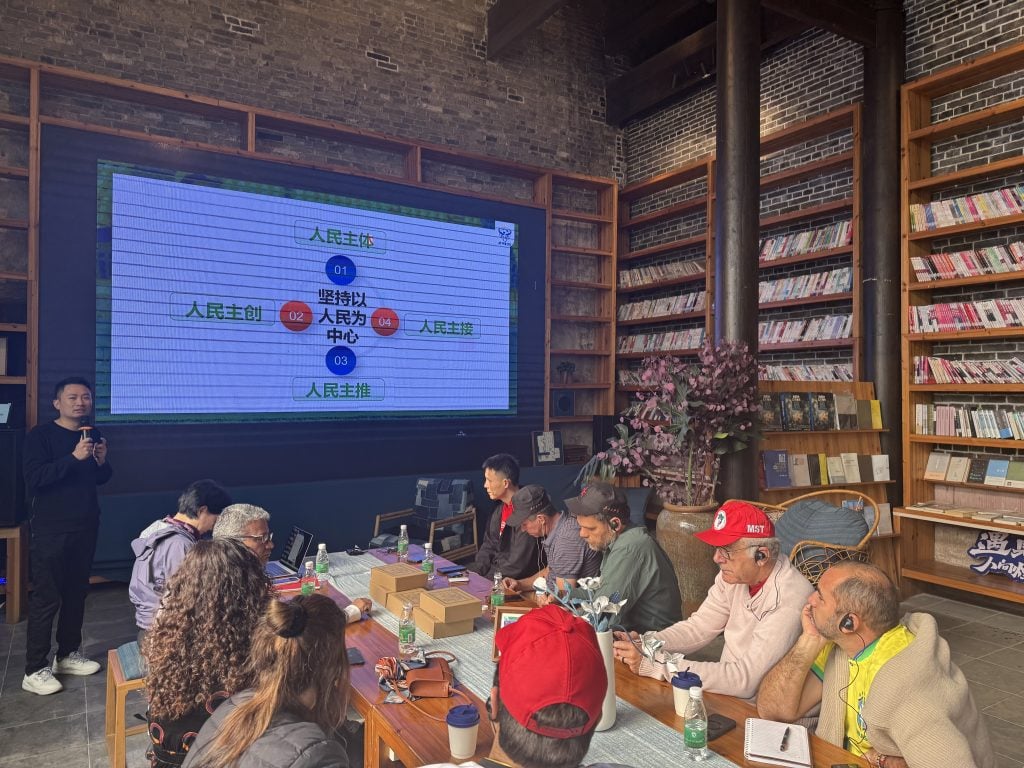This week, seven parliamentarians engaged in the agrarian reform agenda from different Brazilian regions concluded a visit to China intended to show them the Asian country’s policies and experiences in rural revitalization and the fight against poverty. The idea is also to strengthen cooperation in family farming, especially regarding agricultural mechanization and bioinput production.
“This is a historic visit: It’s the first delegation of pro-agrarian reform parliamentarians from Brazil to go to China. It has brought us some very important recommendations, especially on agricultural mechanization,” said state deputy Marina dos Santos (Workers’ Party, from the State of Rio de Janeiro), who was part of the delegation.
The delegation also included Mauro Rubem (Workers’ Party, from the State of Goiás), Missias Dias (Workers’ Party, from the State of Ceará), Rosa Amorim (Workers’ Party, from the State of Pernambuco), Jorge Brand “Goura” (Workers’ Party, from the State of Paraná), and councillors Edilson Barbosa (Democratic Labor Party, from the State of Pernambuco) and Francisco “Tito” de Chagas Moura (Workers’ Party, from the State of Pará).
Mechanization and digitalization of agriculture
The Brazilian parliamentarians visited one of the headquarters of China’s state-owned Sinomach Corporation to learn about the development of digital tools for agriculture. Sinomach Digital has a partnership with the University of Brasilia (UnB, in Portuguese), which recently launched the Brazil-China Center for Family Farming, a project for the use of Big Data in agriculture.
When they met with the Brazilian ambassador to China, Marcos Galvão, the parliamentarians discussed the need for the embassy to support partnership initiatives on agricultural machinery factories and bioinputs for peasant agriculture in Brazil.
Another visit was to the Organic Recycling Research Institute of the China Agriculture University, in the city of Suzhou, where the politicians visited reactors for bioinput production, organic rice fields and agricultural machinery for rice production.
Ceará’s Workers’ Party state deputy Manoel Missias Bezerra says that Ceará is also discussing the construction of factories to produce farm machinery. Along with Maranhão, Paraíba and Rio Grande do Norte, Ceará is one of the states where Chinese machines are already being tested in land reform settlements.
“We are having discussions on bringing factories to produce machines geared to the needs of family farming in Brazil, specifically thought to address their realities, the biomes in each state,” said Missias.
Councilor Edilson said discussions are underway about building a bioinput factory in his city, Caruaru.
“This will lead to a relatively large drop in production costs for farmers in our municipality, in addition to increasing our productivity. And that will mean, in the medium and long term, an affordable price for the population,” he says.
Meeting with Dilma
The issue was also discussed with the president of the New Development Bank, Dilma Rousseff, who has just been re-elected to the post, although there are still no details about possible support from the bank.
Congresswoman Marina dos Santos proposed that Dilma receive the Tiradentes Medal at the next BRICS Summit, in Rio de Janeiro. She was awarded in 2006 by then state deputy Inês Pandeló (Workers’ Party), but has not yet received the medal.
State deputy Missias said that one of the topics on the agenda with the NDB’s president was renewable energy, one of the priorities of the so-called BRICS Bank.
According to him, the bank’s teams and the government of Ceará will begin talks to encourage the development of solar plants in the state.
“In northeastern Brazil, there are states with intense sunshine, and there is great potential for agrarian reform, especially in settlements, a lot of land where we can start projects aimed at family farming and even reduce energy costs in agriculture,” argues Missias.
“We’re already talking with the governor of Ceará and other governors in the Northeast region in addition to the Northeast Consortium so that we can take this technology and spread it throughout Brazil, something that really meets what we need to reduce costs in peasant agriculture,” says the deputy from Ceará.
Fighting poverty and rural revitalization
Another highlight of the trip was the fight against poverty and rural revitalization initiatives. To discuss the issue, the parliamentarians met with the deputy minister of the International Department of the CPC Central Committee, Zhao Shitong, the president of the China Center for Economic Cooperation, Ke Zhizhong, and Liu Junwen, director of China’s International Poverty Reduction Center.
They also went to Rongjiang County, which organizes the Cun Chao peasant soccer championship, one of the tourism initiatives related to the rural revitalization process. Rongjiang was one of the last counties in China to be removed from the extreme poverty list in 2020.

For Goiás state deputy Mauro Rubem, the visit was “extremely important and rich.” The province has moved away from the poverty line and continues its efforts to stay out of it, with integration in communication and transportation infrastructure.
“They have moved more than a million and a half people to these territories to provide direct support. They have carried out a very popular process of stimulating the economy, generating employment, and producing food. Also, China has defined two elements as the country’s main basis: Guaranteeing food and clothing for all the people of China,” says Marina.
“If we want to fight social inequality, we need to learn from China, about this important social technology that they have built to eradicate extreme poverty,” said Congresswoman Rosa, who emphasized that peasant agriculture was strategic to this process.
“The parliamentarians who joined us on this mission will play an extraordinary role in negotiating resources, legal instruments to allow Brazil-China cooperation to continue moving forward,” said Caruaru councillor Edilson.




